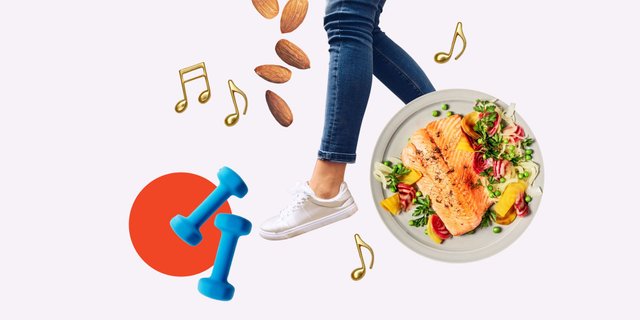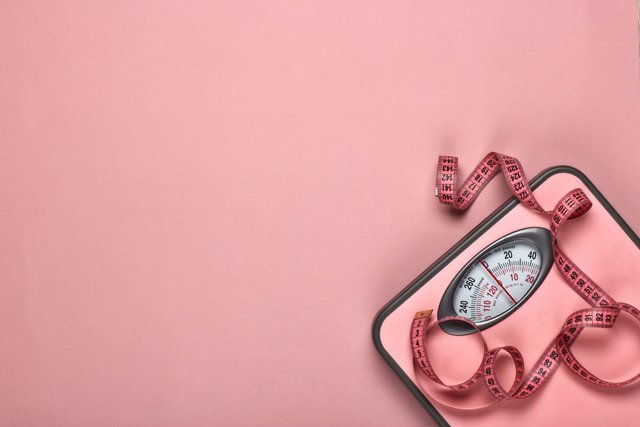23 ways to lose weight fast, safely, helps reduce fat, burn fat most effectively
Studies show that everything from sleep quality to stress levels can greatly affect hunger, metabolism, body weight and belly fat.

Beautiful body thanks to the method of keeping fit properly.
Diet and exercise may be the main ingredients for weight loss for women, but there are many other factors that are important for you to lose weight.
In fact, studies show that everything from sleep quality to stress levels can greatly affect hunger, metabolism, body weight and belly fat.
Fortunately, making a few small changes to your daily routine can be of great benefit when it comes to losing weight.
Here are 23 top effective weight loss tips:
- Cut back on refined carbs
Refined carbs (starch) undergo deep processing and over processing, reducing the amount of fiber and micronutrients in the final product.
These foods increase blood sugar, increase hunger and are associated with increased body weight and belly fat.
Therefore, it is best to limit refined carbs such as white bread, pasta and pre-packaged foods. Opt for whole-grain products like oats, brown rice, quinoa, buckwheat and barley instead.

Weight loss needs a comprehensive investment!
- Train resistance as a habit
Resistance training helps with weight loss, muscle building and endurance. It is especially beneficial for women who lose weight over 50, as it increases the number of calories your body burns at rest. It also helps preserve bone mineral density to protect against osteoporosis.
Lifting weights, using exercise equipment or doing body weight exercises are a few simple ways to get started.
- Drink more water
Drinking plenty of water is an easy and effective way to promote weight loss with minimal effort.
According to a small study, drinking 500 ml of water temporarily increased the number of calories burned 30% after 30 minutes. Studies also show that drinking water before meals can increase weight loss and reduce calorie consumption by about 13%.
- Eat lots of Protein
Protein-rich foods like meat, poultry, seafood, eggs, milk and legumes are an important part of a healthy diet, especially when losing weight.
In fact, studies note that following a high-protein diet can reduce cravings, increase feelings of fullness and boost metabolism.
A small 12-week study also found that increasing protein intake by just 15% reduced daily calories to an average of 441 calories - resulting in a loss of up to 5 kg.
- Set a sleep schedule
Studies show that getting enough sleep can be important for weight loss like diet and exercise.
Many studies have been linked to sleep deprivation with increased body weight and higher ghrelin levels, the hormone responsible for stimulating hunger.
Furthermore, a study in women found that sleeping at least seven hours a night and improving sleep quality overall increased the likelihood of successful weight loss by 33%.
- Practice adding Cardio
Aerobic exercise, also known as cardio, raises your heart rate to burn extra calories.
Studies show that adding more cardio to your routine can help with significant weight loss - especially when combined with a healthy diet.
For best results, aim for at least 20 minutes and 40 minutes of cardio daily or about 150 minutes per week.
- Make a food diary
Using a food diary to keep track of what you eat is an easy way to keep yourself accountable and make healthier choices when choosing foods during weight loss.
Food journals also make it easier to count calories, which can be an effective strategy for weight loss.Furthermore, a food journal can help you stick to your goals and can help you lose weight. more lasting.

- Add fiber
Adding more fiber to your diet is a popular weight loss strategy to help slow the process of emptying your stomach and helping you feel fuller longer.
Without making any other changes to your diet or lifestyle, an increase of 14 grams of dietary fiber was associated with a 10% reduction in calories and a 1.9 kg loss in 3.8 months. .
Fruits, vegetables, legumes, nuts, seeds and whole grains are all great sources of fiber as part of a balanced diet.
- Practice mindful eating
Mindful eating involves reducing the external distractions during your meal. Try eating slowly and focusing your attention on the way your food, smells, tastes and feelings feel. This practice promotes healthier eating habits and is a powerful tool for weight loss.
Studies show that eating slowly can enhance feelings of fullness and can lead to a significant reduction in daily calorie intake.

Losing weight by thinking is real.
- Smart snacks also help with weight loss
Choosing healthy, low-calorie snacks is a great way to lose weight and keep track by minimizing hunger levels between meals.
Choose snacks high in protein and fiber to promote satiety and curb cravings.
Whole fruits combined with nut butter, vegetables with hummus, or Greek yogurt with nuts are examples of nutritious snacks that can support long-term weight loss.
- Abandon the diet
While fad diets often promise quick weight loss, they can do more harm than good. Improper diet is not only difficult to reduce waist size and also not beneficial to your health.
For example, a study in women at university found that eliminating certain foods from their diet increased cravings and overeating. That leads to weight gain rather than weight loss!
Fad diets can also promote unhealthy eating habits, which are detrimental to long-term weight loss. So losing weight and losing weight is a process that requires you to be persistent.
- Besides exercise, want to reduce fat need daily activities
When you don't have enough time and can't exercise enough, being active throughout the day is an easy way to burn extra calories and increase weight loss.
In fact, it's estimated that non-exercise-related activity can account for 50% of your body's calories burned throughout the day.

Should keep active daily life active.
Taking the stairs instead of the elevator, parking away from the door or taking a walk during lunch break are a few simple strategies to increase your total steps and burn more calories.
- Set achievable goals
Setting goals helps you reach your weight loss goals more easily and helps you succeed to achieve your desired weight.
Objectives must be specific, measurable, achievable, relevant and time-bound. These goals require you to be responsible and devise a plan to achieve your goals.
For example, instead of simply setting a goal of losing 10 kg, set a goal of losing 10 kg in 5 months by writing a food diary, going to the gym 3 times a week, and adding a serving of vegetables. each meal.
- Try to avoid stress
Some studies suggest that increased stress levels may contribute to an increased risk of weight gain over time. Stress can also change the pattern of healthy eating and contribute to problems like overeating. You may notice that when stressed, there is a tendency to eat more sweets and easily cause fat.
Exercising, listening to music, practicing yoga, journaling and talking to friends or family are some easy and effective ways to reduce stress levels.

Do not let the scale haunt you.
- Try HIIT training
Intense training, also known as HIIT, combines intense movements with short recovery time to help your heart rate rise.
Regular alternating cardio with HIIT a few times per week can help with weight loss.
HIIT can reduce belly fat, increase weight loss and has been shown to burn more calories than other activities, such as cycling, jogging and resistance training.
- Lose weight successfully by eating smaller plates
Switching to smaller, smaller plates helps to promote portion control and help with weight loss.
Although the study was still limited and inconsistent, one study found that participants who used smaller plates ate less and felt more satisfied than those using regular and large sized plates. .
Using a smaller plate can also limit your portion size, which can reduce the risk of overeating and control calorie consumption.
- Probiotic probiotic supplementation also helps to reduce fat effectively
Probiotics are a type of beneficial bacteria that can be consumed through food or supplements to help support gut health.
Studies show that probiotics can promote weight loss by increasing fat secretion and changing hormone levels to reduce appetite.
In particular, Lactobacillus gasseri is a particularly effective strain of beneficial bacteria. Studies show it can help reduce belly fat and total body weight.

- Practicing Yoga
Studies show that practicing yoga can help prevent weight gain and increase fat burning.
Yoga can also reduce stress and anxiety levels - both of which can be linked to emotional eating.
In addition, practicing yoga has been shown to reduce bland eating and prevent food preoccupation to support healthy eating behaviors.
- Chew slower
Making a conscious effort to chew slowly and thoroughly can help increase weight loss by cutting down on the amount of food you eat.
According to one study, chewing 50 bites per bite significantly reduced calories compared to chewing 15 times per bite.
Another study showed that chewing food by 150% or 200% more than the normal amount of food decreased by 9.5% and 14.8% respectively.

Eat well for a long time, chew carefully with a slim waist.
- Eat a healthy breakfast
Eating your first nutritious breakfast in the morning can help start the day perfectly and keep you feeling full until the next meal.
Eating a protein-rich breakfast has been shown to reduce the levels of the hormone ghrelin that promotes hunger. This can help keep appetite and hunger under control.
- Experiment with intermittent fasting
Intermittent fasting involves alternating between eating and fasting for a specific time window each day. Fasting time usually lasts 14 hours - 16 hours, even some people test 24 hours.
Intermittent fasting is thought to be as effective as cutting calories when losing weight.
It can also help boost metabolism by increasing the number of calories burned at rest.
- Processed foods cause uncontrolled weight gain
Processed foods often contain lots of calories, sugar and sodium - but few important nutrients like protein, fiber and micronutrients.
Studies show that consuming a lot of processed foods is linked to excess body weight - especially in women.
Therefore, it's best to limit processed foods and choose whole foods, such as fruits, vegetables, healthy fats, lean protein, whole grains and legumes.
- Cut back on added sugar to aid weight loss.
Added sugar is a major factor in weight gain and serious health problems, such as diabetes and heart disease.
Foods high in sugar are loaded with calories but lack the vitamins, minerals, fiber and proteins that your body needs to thrive.
For this reason, it's best to minimize sugary foods like soda, candy, fruit juice, sports drinks and sweets to help lose weight and optimize overall health.
In summary, the key to successful weight loss is:
Many different factors play a role in weight loss, and some go far beyond diet and exercise. Making a few simple modifications to your lifestyle can help promote long-term weight loss, especially for women.
Including even one or two of these strategies in your daily routine can help maximize results and promote healthy, sustainable weight loss.